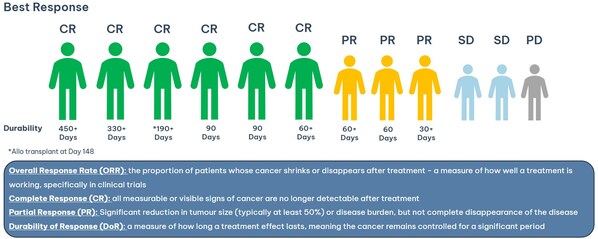15 July 2025 | Tuesday | News

Imugene Limited (ASX: IMU), a clinical-stage immuno-oncology company, is pleased to announce exciting new data from its Phase 1b clinical trial evaluating azer-cel (azercabtagene zapreleucel) in patients with relapsed/refractory diffuse large B-cell lymphoma (DLBCL).
In February 2025, Imugene announced that a total of four out of seven patients had achieved a Complete Response (CR), defined as the disappearance of all signs of cancer in response to treatment. Since then, two additional patients have also achieved a Complete Response, and three patients have achieved Partial Response (cancer reduction by at least 50%) bringing the best overall response rate to 75% and the CR rate to 55%. The duration of response continues to mature. These patients are being treated with azer-cel and interleukin 2 (IL -2).
|
Evaluable |
Treatment |
N |
Overall Response Rate (ORR) |
Complete Response (CR) At Day 60 |
Best Durability (Time of response) |
|
DLBCL |
Lymphodepletion (LD)1 +azer-cel +Interleukin-2 (IL-2) |
12 |
9/12 (75%) |
6/11 (55%) |
>450 days on going |
For approved, autologous CD19 CART products, the average time to best response is 2-3 months with some patients taking up to 6 months to achieve their best response.
Azer-cel is being developed as a potential allogeneic, off-the-shelf, CAR T-cell therapy, addressing key limitations of approved autologous CAR T drugs, including geographical access to treatment centres, manufacturing complexity and time to receive treatment (on-demand).
Based on the updated response rate and maturing durability data, as well as having been awarded FDA Fast Track Designation for DLBCL in March 2025, Imugene will request a Type B (End of Phase 1) Meeting in Q4 2025, with the US FDA to present the data and to discuss designs for a pivotal / registrational trial for azer-cel.
Leslie Chong, Managing Director and CEO of Imugene, said:
"We are very pleased with the continued positive data coming from the azer-cel trial, which further reinforces its potential as a treatment for DLBCL patients who have failed several previous lines of therapy. The data also significantly improves our position from both a regulatory and commercial standpoint, and we look forward to expanding on these discussions with the FDA.
Additionally, given the positive results, we are opening the trial to other niche blood cancer indications, such as PCNSL and other subtypes of B Cell Lymphoma, for CAR T naïve patients. This is a high unmet need with potential to expedite and expand the scope of azer-cel."
Dr John Byon, Chief Medical Officer of Imugene, said:
"DLBCL remains one of the most aggressive forms of lymphoma, and despite the existing therapies, there are a large number of patients that still face relapse or resistance. We are seeing significant potential from azer-cel to date in its ability to provide a critical step forward for these patients who have relapsed on multiple therapies, offering deep and durable responses with a one-time treatment.
We remain deeply committed to transforming the standard of care in difficult-to-treat blood cancers, where significant unmet medical need still exists."
The FDA Fast Track Designation for DLBCL received for azer-cel is designed to facilitate the development and expedite the review of drugs that address serious or life-threatening conditions and meet an unmet medical need. Benefits of the designation include more frequent meetings with the FDA to discuss development plans, the option for rolling review of regulatory submissions, and potential eligibility for Accelerated Approval and Priority Review upon meeting relevant criteria.
Imugene continues to actively enrol patients into the Phase 1b azer-cel trial at ten US sites with up to six sites in Australia planned, after the first Australian patient was dosed in January 2025 at Royal Prince Alfred Hospital in Sydney, resulting in a Complete Response.

© 2025 Biopharma Boardroom. All Rights Reserved.